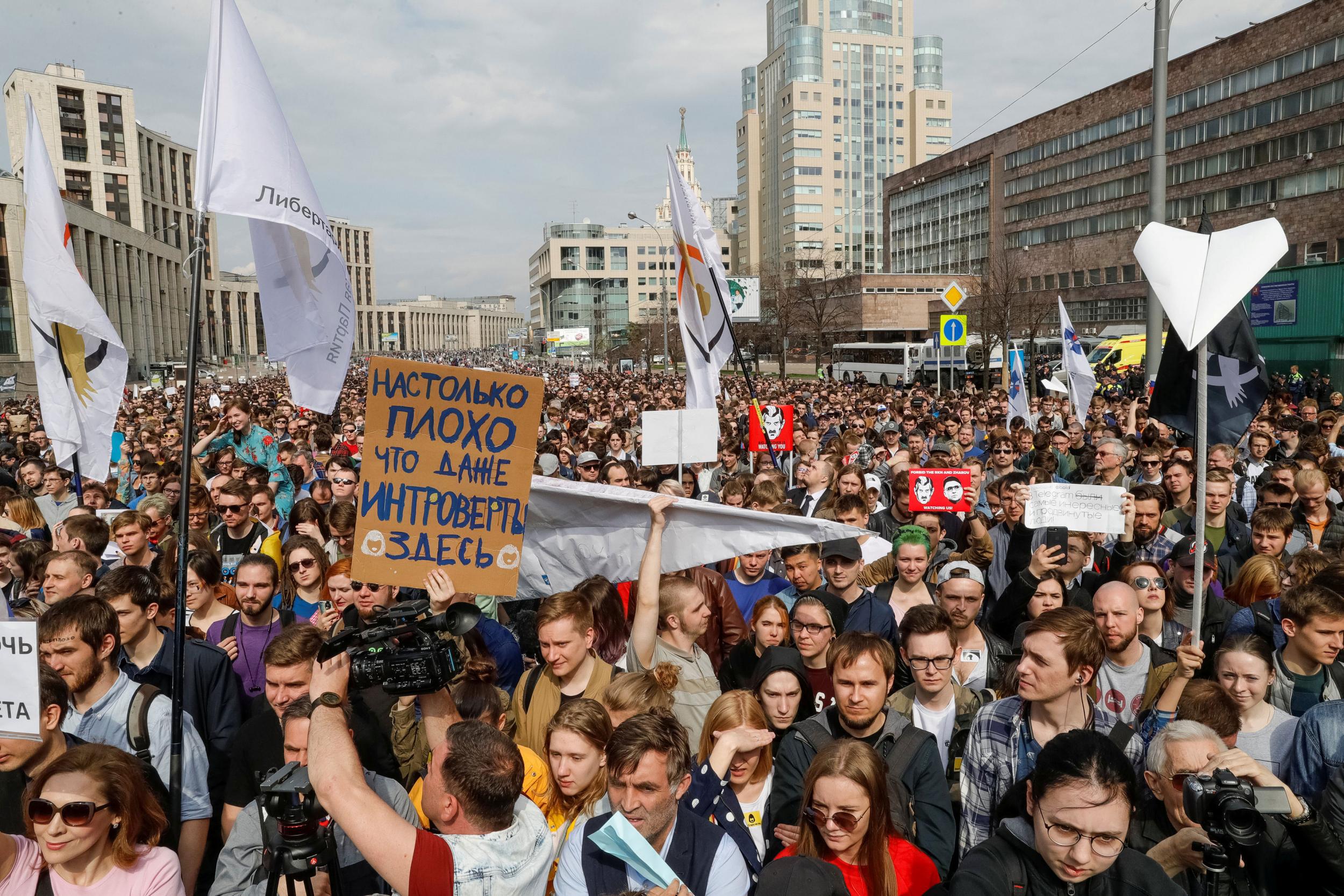Russian internet protests: Thousands take to the streets to show opposition to censorship
Telegram messenger shutdown is raising fears Kremlin could introduce even more restrictive policies

Your support helps us to tell the story
From reproductive rights to climate change to Big Tech, The Independent is on the ground when the story is developing. Whether it's investigating the financials of Elon Musk's pro-Trump PAC or producing our latest documentary, 'The A Word', which shines a light on the American women fighting for reproductive rights, we know how important it is to parse out the facts from the messaging.
At such a critical moment in US history, we need reporters on the ground. Your donation allows us to keep sending journalists to speak to both sides of the story.
The Independent is trusted by Americans across the entire political spectrum. And unlike many other quality news outlets, we choose not to lock Americans out of our reporting and analysis with paywalls. We believe quality journalism should be available to everyone, paid for by those who can afford it.
Your support makes all the difference.Thousands of Russians took to central Moscow on Monday in a rally against internet censorship and a government ban on the Telegram social media app.
Since a 13 April court decision outlawed the programme, authorities have taken a no-nonsense approach to blocking it. But their actions have also brought large parts of the web to a standstill – while Telegram continues to function. Many now fear the Kremlin will put in place even more restrictive information policies in an attempt to grasp control.
With banners such as “Big Moron Is Not Blocking You”, “Down with the Tsar” and “Things are so bad that even introverts have come here”, the mostly young crowd used every manner of protest to communicate their displeasure to the government. They threw paper aeroplanes in the air – a reference to the app’s logo. And they shouted angry slogans at President Vladimir Putin and his allies.
Writing on social media, Telegram’s self-exiled Russian founder Pavel Durov hailed the event as “unprecedented”. He had led the calls for “digital resistance” to the Kremlin’s moves and even launched a new Russian-language Telegram channel on the eve of the protest.
While the estimated 12,300 who attended is some way off the numbers attending rallies in 2011 and 2012, it is the largest turnout to an opposition event for some time.
“Your energy will change the world,” Mr Durov told the protesters via social media.
And there was certainly plenty of energy on show during the rally. The longer the afternoon wore on, the louder the speeches became – and the redder the faces.
One of the first to appear on stage was an internet entrepreneur called Alexander. He complained about how the Kremlin’s heavy-handed approach had managed to block access to PlayStation games. “I feel your pain,” he said to the crowd. Some nodded back.
A 24-year-old rapper called Loqiemean took over. “We are cleverer than our parents,” he shouted, now with veins popping at his neck. “We are making the politics, we are making the economy! Yes! Yes!”
The compere whipped up the crowd. “Are you enraged?” he asked. “And is it dangerous for you to be enraged?”
But the biggest sparks were created by opposition leader Alexei Navalny, a cosponsor of the rally.
The internet was under attack by people who didn’t understand it, Mr Navalny said: “It is the one industry in our destitute country that has been growing on its own. And now these guys… these guys with fat faces… they are saying people are misbehaving on their internet there… so now we’re going to gobble it up!”
The Putin critic was earlier approached by a policeman and warned that he risked arrest if he tried to call people to his own rally, due to take place on 5 May, two days before Putin’s inauguration. That rally has predictably not been sanctioned by authorities.
Mr Navalny chose to playfully skip around the subject – to the merriment of the crowd and even many of the policemen standing by.
“You know, I would never implore you to come to a rally,” he said. “But can I ask, might you possibly be considering coming?”
It is unlikely that the Kremlin will change their mind so close to Mr Putin’s big party. And the last time demonstrations fell on the eve of an inauguration, things ended badly for the opposition.
The violent scenes of the Bolotnaya protests of May 2012 signalled the end of the nascent protest movement, and were accompanied by hundreds of arrests and scores of long-term jail sentences.
Organisers suggested to The Independent that authorities had only given the green light to today’s protest to have an excuse not to sanction the main event on Saturday.
“We only got the papers late on Thursday, and so we had no idea what to expect,” said Sergei Boiko, chair of the Russian Libertarian Party. “But hopefully we’ve sent a strong message to those wanting to build a Chinese or Iranian-style internet here in Russia.”
Join our commenting forum
Join thought-provoking conversations, follow other Independent readers and see their replies
Comments